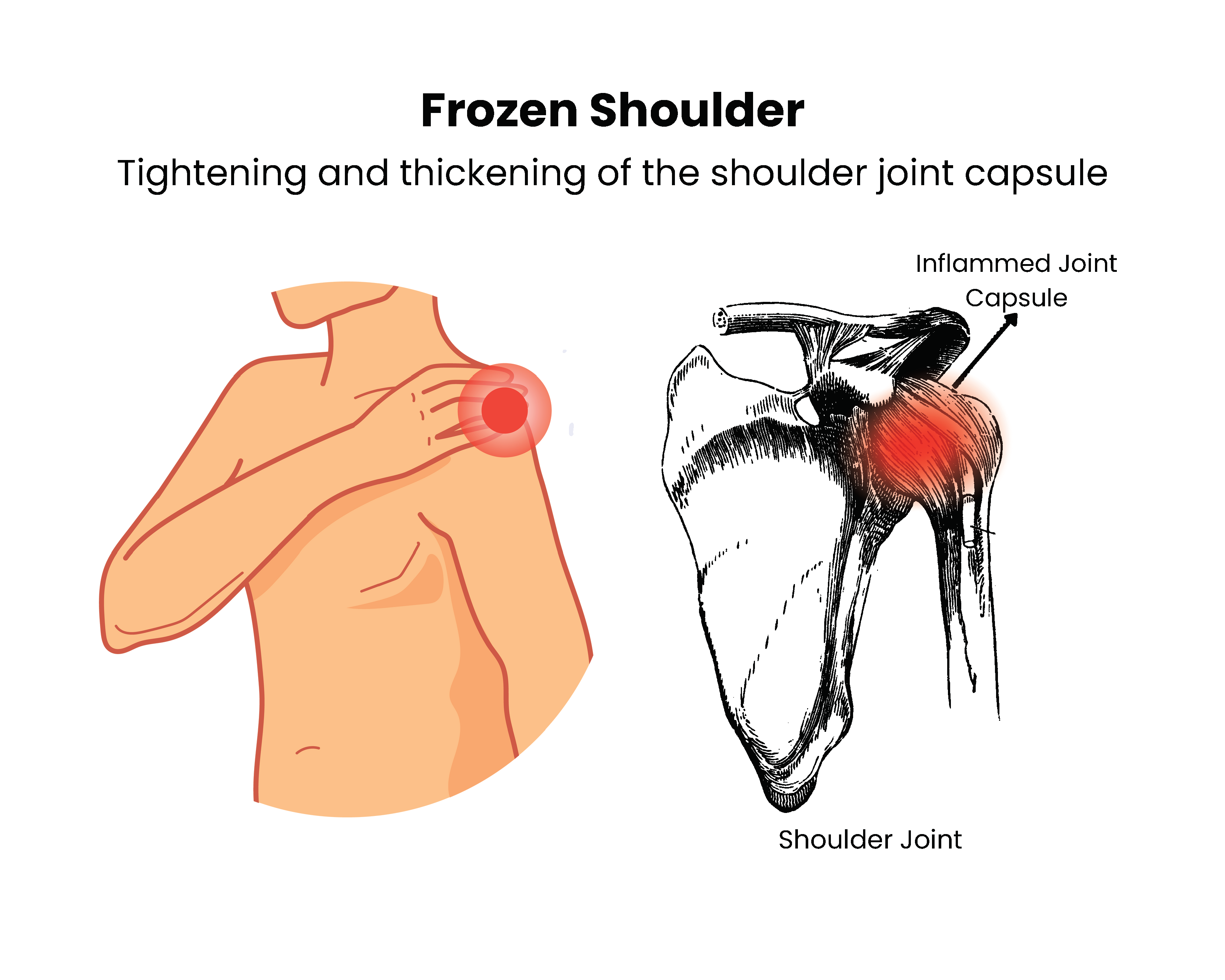Frozen Shoulder Treatment at Minimally Invasive Surgical Solutions (MISS)

Frozen shoulder, also known as adhesive capsulitis, is a condition that causes pain and stiffness in the shoulder joint. Over time, the shoulder’s range of motion becomes severely restricted, impacting daily activities such as reaching, lifting, and even dressing. While the exact cause is not always known, frozen shoulder often develops following injury, surgery, or periods of immobility, and it can take months or even years to fully recover without treatment.
At Minimally Invasive Surgical Solutions (MISS), our interventional radiologist offers advanced, minimally invasive treatments to relieve the pain and stiffness of frozen shoulder, allowing you to regain mobility faster and with less downtime than traditional surgical methods.
Frozen Shoulder Treatment at Minimally Invasive Surgical Solutions
Symptoms of Frozen Shoulder:
- Persistent shoulder pain, often worsening at night
- Limited range of motion, making it difficult to perform everyday tasks
- Stiffness in the shoulder, with increasing difficulty in lifting or reaching
Causes:
While the exact cause of frozen shoulder is often unclear, it can develop after a shoulder injury or surgery, or in conjunction with certain medical conditions such as diabetes, thyroid disorders, or cardiovascular disease.
Diagnosis:
A thorough evaluation, including a physical examination and imaging studies (such as X-rays or MRI), is essential for diagnosing frozen shoulder and determining the extent of the condition.
Advanced Treatment Options
At Minimally Invasive Surgical Solutions, we specialize in offering innovative treatment options for frozen shoulder. Our approach combines expert evaluation with minimally invasive techniques to relieve pain and restore mobility.
1. Embolization for Chronic Tears:
Embolization is a minimally invasive procedure that involves the selective occlusion of blood vessels supplying the affected area. For chronic tears, this procedure can help reduce inflammation and pain associated with shoulder injuries, including:
-
Rotator Cuff Tears: This involves the repair of the rotator cuff tendons, which are essential for shoulder stability and movement.
-
AC Joint Injuries: Addressing issues related to the acromioclavicular joint can alleviate pain and improve function.
-
Glenohumeral Joint Disorders: For problems affecting the main shoulder joint, targeted embolization can help manage symptoms and improve mobility.
-
Scapula and Humerus Concerns: Conditions involving the scapula or humerus may also benefit from this advanced treatment, enhancing recovery and restoring shoulder function.
2. Physical Rehabilitation:
After undergoing procedures, we emphasize the importance of a tailored physical rehabilitation program. Our team works closely with patients to develop a comprehensive rehabilitation plan that includes:
- Range of motion exercises
- Strength training
- Pain management strategies
Why Choose Minimally Invasive Surgical Solutions?
-
Expert Team: Our dedicated specialists have extensive experience in treating shoulder conditions and are committed to providing personalized care.
-
State-of-the-Art Facilities: Our clinic features advanced technology and equipment designed to enhance patient outcomes and ensure safety.
-
Holistic Approach: We focus on the entire patient experience, from diagnosis through recovery, to ensure the best possible results.
Take the First Step Towards Recovery
If you are experiencing symptoms of frozen shoulder or have been diagnosed with a related condition, don’t let pain hold you back. Contact Minimally Invasive Surgical Solutions today to schedule a consultation with our expert team. Let us help you regain your mobility and quality of life.
Why Choose MISS for Frozen Shoulder Treatment?
At Minimally Invasive Surgical Solutions, our interventional radiologists are experts in diagnosing and treating musculoskeletal conditions like frozen shoulder. We prioritize:
- Precision and safety: Utilizing state-of-the-art imaging technology to perform accurate, targeted treatments.
- Minimally invasive techniques: Offering effective options that reduce recovery time and minimize discomfort.
- Personalized care plans: Developing treatment strategies based on each patient’s unique condition and needs.
- Faster recovery: Helping patients regain shoulder mobility more quickly than with traditional surgical approaches.
Take the First Step Toward Recovery
If you’re struggling with frozen shoulder and seeking a less invasive path to recovery, our team at MISS is here to help. Contact us today by calling (408) 918-0405 to schedule a consultation and learn how our innovative, minimally invasive treatments can restore your shoulder’s function and improve your quality of life.
